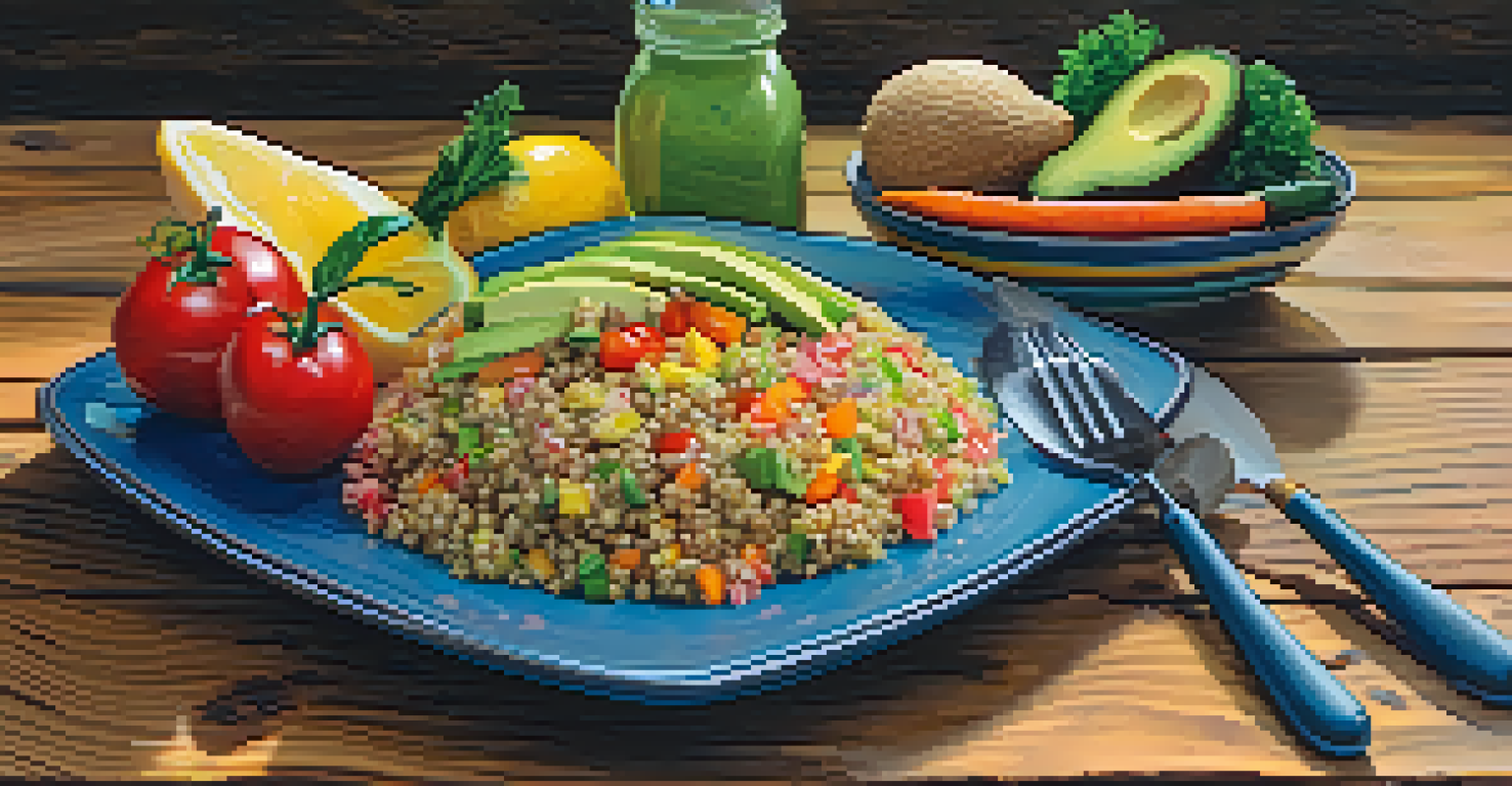The Future of Culinary Medicine in Medical Education

Understanding Culinary Medicine and Its Importance
Culinary medicine merges the art of cooking with nutritional science, emphasizing how food impacts health. It’s not just about recipes; it's about understanding the role of ingredients and cooking methods in promoting wellness. As healthcare professionals, physicians can utilize this knowledge to guide patients towards healthier eating habits.
Let food be thy medicine and medicine be thy food.
Imagine a doctor who not only prescribes medication but also shares easy-to-make recipes tailored to a patient’s health condition. This personalized approach can significantly enhance patient engagement and adherence to dietary recommendations. By incorporating culinary medicine into medical education, future doctors can be better equipped to tackle diet-related health issues.
Furthermore, culinary medicine encourages a holistic view of health, recognizing that food plays a pivotal role in preventing and managing chronic diseases. This paradigm shift can lead to more effective patient care, ultimately resulting in improved health outcomes.
The Shift Towards Integrative Health Approaches
In recent years, there has been a growing recognition of integrative health, which combines conventional medicine with complementary practices. Culinary medicine fits perfectly within this framework, as it emphasizes food as medicine. Medical education is evolving to include these integrative practices, preparing students to think beyond traditional treatment methods.

Consider the impact of this shift: instead of solely focusing on prescribing medications, future healthcare providers will be trained to consider dietary interventions as a key component of treatment. This not only empowers patients but also encourages a more proactive approach to health management.
Culinary Medicine Enhances Healthcare
Culinary medicine integrates cooking with nutritional science, empowering healthcare providers to offer personalized dietary guidance to patients.
As the healthcare landscape continues to evolve, the incorporation of culinary medicine into medical curricula will likely become more common, reinforcing the importance of nutrition in overall health and wellness.
Integrating Culinary Medicine into Medical Curricula
To effectively integrate culinary medicine into medical education, institutions must revamp their curricula to include nutrition and cooking practices. This could involve hands-on cooking classes, workshops, and collaborations with nutritionists and chefs. By doing so, medical students can gain practical skills that enhance their ability to counsel patients on dietary choices.
The doctor of the future will no longer treat the human frame with drugs, but rather will cure and prevent disease with nutrition.
For example, a cooking workshop could allow students to prepare nutritious meals while learning about the health benefits of various ingredients. Such experiential learning not only makes the information memorable but also instills confidence in students as they prepare to advise patients.
Moreover, integrating culinary medicine into medical training can lead to a more well-rounded education, fostering a deeper understanding of the connection between diet and health. As future physicians embrace these lessons, they will be better prepared to address the dietary needs of their patients.
Challenges in Implementing Culinary Medicine Education
Despite the benefits, implementing culinary medicine into medical education faces several challenges. One significant hurdle is the existing curriculum's rigidity, which may not easily accommodate new subjects. Additionally, faculty may require training to effectively teach culinary medicine and its applications in patient care.
Another challenge is the allocation of resources, including funding and time, to develop and sustain cooking programs within medical schools. Without adequate support, these initiatives may struggle to gain traction, hindering students' exposure to culinary medicine.
Integrative Health is Gaining Traction
The shift towards integrative health approaches emphasizes the importance of nutrition, encouraging future healthcare professionals to include dietary interventions in treatment plans.
However, overcoming these challenges is crucial for the advancement of medical education. By advocating for changes and providing the necessary resources, educational institutions can ensure that future healthcare providers are equipped with the knowledge and skills to promote health through culinary medicine.
The Role of Technology in Culinary Medicine Education
Technology plays a vital role in modern education, and culinary medicine is no exception. Online platforms and mobile applications can provide medical students with access to nutritional resources, cooking tutorials, and meal planning tools. This accessibility can enhance their learning experience and promote continuous education beyond the classroom.
For instance, virtual cooking classes can enable students to practice culinary skills at their convenience while interacting with experts. This flexibility accommodates diverse learning styles and schedules, making it easier for students to engage with culinary medicine.
Moreover, technology can facilitate collaboration between medical schools and culinary programs, expanding the resources available for students. By leveraging these tools, the future of culinary medicine education can be both innovative and effective.
Benefits of Culinary Medicine for Patient Care
Integrating culinary medicine into medical education can significantly benefit patient care. When healthcare providers are knowledgeable about nutrition and cooking, they can offer more comprehensive guidance to their patients. This expertise not only builds trust but also empowers patients to take charge of their health through informed dietary choices.
Furthermore, culinary medicine can foster stronger doctor-patient relationships. When physicians share cooking tips or meal plans, it creates a collaborative atmosphere where patients feel supported in their health journeys. This connection can lead to better adherence to dietary recommendations and improved health outcomes.
Challenges in Culinary Medicine Education
Implementing culinary medicine in medical curricula faces obstacles like rigid structures and resource allocation, but overcoming these is vital for improving patient care.
Ultimately, the integration of culinary medicine equips physicians to address the root causes of many health issues, paving the way for a more proactive and preventive approach to healthcare.
A Vision for the Future of Culinary Medicine in Education
As we look ahead, the future of culinary medicine in medical education appears promising. With an increasing emphasis on holistic health and preventive care, culinary medicine is likely to become a staple in medical curricula. This evolution will prepare future healthcare professionals to tackle the complexities of diet-related health challenges more effectively.
The vision includes a healthcare system where doctors not only treat illnesses but also inspire healthier lifestyles through food. Imagine a future where medical graduates are as comfortable discussing recipes as they are discussing prescriptions—a future where culinary medicine is at the forefront of patient care.

By embracing this vision, educational institutions can cultivate a new generation of healthcare providers who are equipped to promote health through the power of food, ultimately transforming the landscape of medical education and patient care.